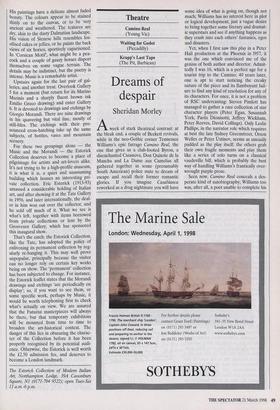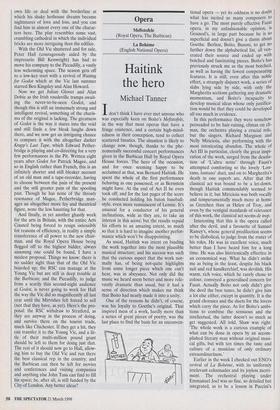Theatre
Camino Real (Young Vic) Waiting for Godot (Piccadilly) Krapp's Last Tape (The Pit, Barbican)
Dreams of despair
Sheridan Morley
Aweek of stark theatrical contrast: at the bleak end, a couple of Beckett revivals, while in the neo-Gothic corner Tennessee Williams's epic farrago Camino Real, the one that gives us a club-footed Byron, a disenchanted Casanova, Don Quixote de la Mancha and La Dame aux Camelias all gathered together in some (presumably South American) police state to dream of escape and recall their former romantic glories. If you imagine Casablanca reworked as a drug nightmare you will have some idea of what is going on, though not much; Williams has no interest here in plot or logical development, just a vague desire to bring together some literary and dramat- ic superstars and see if anything happens as they crash into each others' fantasies, egos and disasters.
Yet, when I first saw this play in a Peter Hall production at the Phoenix in 1957, it was the one which convinced me of the genius of both author and director. Admit- tedly I was 16, which is a perfect age for a tourist trip to the Camino; 40 years later, one is apt to start noticing the creaky nature of the piece and its flamboyant fail- ure to find any kind of resolution for any of its characters. For once, it is not a problem of RSC undercasting: Steven Pimlott has managed to gather a rare collection of star character players (Peter Egan, Susannah York, Paola Dionisotti, Jeffrey Wickham, Peter Reeves, David Collings). Only Leslie Phillips, in the narrator role which requires at best the late Sydney Greenstreet, Orson Welles or Peter Ustinov, seems as uneasily padded as the play itself; the others grab their own fragile moments and play them like a series of solo turns on a classical vaudeville bill, which is probably the best way of handling Williams's frantically over- wrought purple prose.
Seen now, Camino Real conceals a des- perate kind of autobiography; Williams too was, after all, a poet unable to complete his own life or deal with the borderline at which his shaky hothouse dreams became nightmares of love and loss, and you can find him in almost every one of the charac- ters here. The play resembles some vast, crumbling cathedral in which the individual bricks are more intriguing than the edifice.
With the Old Vic shuttered and for sale, Peter Hall (courageously aided by the impresario Bill Kenwright) has had to move his company to the Piccadilly, a vastly less welcoming space. The season gets off to a low-key start with a revival of Waiting for Godot which at the Vic last summer starred Ben Kingsley and Alan Howard.
Now we get Julian Glover and Alan Dobie as the Irish vaudeville tramps await- ing the never-to-be-seen Godot, and though this is still an immensely strong and intelligent revival, something of the charis- ma of the original is lacking. The greatness of Godot is the way it stares into the void and still finds a few bleak laughs down there, and we now get an intriguing chance to compare it with the altogether darker Krapp's Last Tape, which Edward Pether- bridge is playing and co-directing for a very few performances in the Pit. Written eight years after Godot for Patrick Magee, and so in English rather than French, this is an infinitely shorter and still bleaker account of an old man and a tape-recorder, having to choose between the pain of the present and the still greater pain of the spooling past. Though he has none of the throaty resonance of Magee, Petherbridge man- ages an altogether more fey and theatrical figure, none the less haunting for that.
And finally, in yet another ghastly week for the arts in Britain, with the entire Arts Council being forced to resign ostensibly for reasons of efficiency, in reality a simple transference of all power to the new chair- man, and the Royal Opera House being flogged off to the highest bidder, always assuming one could be found, I have a modest proposal. Things we know: there is no sadder sight than that of the Old Vic boarded up; the RSC can manage at the Young Vic but are still in deep trouble at the Barbican; and the Piccadilly, to judge from a scarily thin second-night audience at Godot, is never going to work for Hall the way the Vic did so magnificently all last year until the Mirvishes felt forced to sell (not that they have, as yet). Here's the pro- posal: the RSC withdraw to Stratford, as they are anyway in the process of doing, and survive there on the tourist trade, much like Chichester. If they get a hit, they can transfer it to the Young Vic, and a lit- tle of their multi-million pound grant should be left to them for doing just that. The rest of it should now go to Hall, allow- ing him to buy the Old Vic and run there the best classical rep in the country; and the Barbican can then be left for movies and conferences and visiting companies and anything else John Tusa can find to fill his space; he, after all, is still funded by the City of London. Any better ideas?





































































 Previous page
Previous page